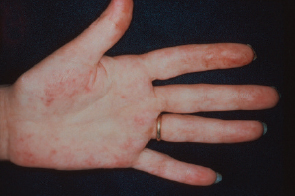
Patients with antiphospholipid syndrome suffer from thrombosis, as well as chronic vascular lesions. The acquired autoimmune disorder is characterized by elevated levels of circulating antiphospholipid antibodies that are associated with thrombotic events, nephropathy and miscarriage. The syndrome may occur alone or in conjunction with other autoimmune disorders, such as systemic lupus erythematosus.
Patients with severe antiphospholipid syndrome not only experience complications from thrombosis, but also have vascular lesions with vascular cellular infiltrates and intimal hyperplasia. Such lesions have been observed in the kidney, as well as coronary, carotid and mesenteric arteries. Individuals who require and receive a kidney transplant continue to be plagued by recurring vascular lesions. Moreover, even patients with less severe antiphospholipid syndrome have vasculopathy, particularly in the brain and kidneys.
The main treatment for antiphospholipid syndrome is long-term antithrombotic therapy. Lesions develop, however, despite effective treatment for coagulation. Thus, even with the best efforts of physicians, patients suffer from a paucity of adequate therapies and chronic vascular lesions. Taken together, the therapeutic evidence therefore suggests that the coagulation defect is not central to lesion formation and that a distinct, heretofore unknown, mechanism underlies the pathology of the lesions.
The Research
New insights into the molecular mechanism behind antiphospholipid antibody-induced cell activation have come, however, from the work of Guillaume Canaud, MD, PhD, postdoctoral researcher at the Institute Necker-Enfants Malades in France, and colleagues. They published the results of their clinical studies and in vitro experiments in the July 24 issue of The New England Journal of Medicine.1 Their experiments reveal that the mammalian target of rapamycin complex (mTORC) pathway appears to underlie the vascular lesions that characterize antiphospholipid syndrome.
One hour of exposure to sirolimus completely inhibited activation of the epithelial cells by antiphospholipid antibodies.
mTORC, which has been previously implicated in vascular stenosis, is a kinase that integrates the regulation of cellular growth, proliferation and survival. Dr. Canaud et al report that antiphospholipid antibodies stimulate the mTORC pathway, leading to cell proliferation and pathology. More importantly, they report that sirolimus, an mTORC inhibitor, may be able to prevent the development of vasculopathy in this patient population.
Dr. Canaud and team focused their research efforts on kidney biopsy specimens from patients with primary or secondary antiphospholipid syndrome nephropathy. They used double immunostaining to evaluate the phosphorylation of S6 ribosomal protein (S6RP) and AKT (phosphorylation of Ser473) and determine activation of mTORC1 and mTORC2, respectively. Intimal hyperplasia was associated with the activation of both mTORC1 and mTORC2. When they examined the vascular endothelium of proliferating intrarenal vessels from patients with antiphospholipid syndrome, they also found evidence of activation of the mTORC pathway. The greatest activation was seen in vessels with the most prominent lesions.

